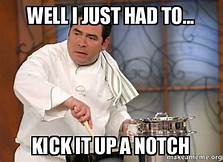Quote:
Originally Posted by JRutledge

I'm convinced the only reason Billy responses several times in a row is to get higher on the posting list.
|
No. The reason is to get some semblance of closure on complex issues that may have been unintentionally left unclear by the NFHS.
There are different level of rules expertise among those of us that seriously study the rules.
For some rules experts rules expertise means to understand rules in such a way as to get them through 99% of situations one may encounter in "real game" situations. This level of study, along with mechanics study, signals study, experience, game management "people" skills, physical ability, understanding of the game, etc., will lead to a very successful basketball officiating career, maybe becoming one of the best basketball officials in an area, possibly becoming a local, or state, interpreter/trainer/clinician, etc.
And then there are those, like myself, who wish to kick up their rules expertise a notch, maybe to a level of intellectual curiosity others may not desire. We attempt to understand rules at a level that exceeds 99% of situations one may find occurring in "real game" situations, odd situations that test one's rules knowledge on a "written exam" level.
Why do we do it? I can't speak for all, but for me it's not to be a better "real game" official, it's not to be a better trainer, and it's not to show off. It's the intellectual challenge of "deep diving" into the rulebook and casebook to try to find answers that may not be readily apparent at first glance, especially regarding odd situations unintentionally left unclear by the NFHS.
And as an added extra bonus, during a "deep dive" one may occasionally come across an "Easter egg" situation, or interpretation, that may actually be useful in a "real game".
Some "research" requires multiple posts, to clarify something by peeling away additional layers of the onion, or to try to clarify something with new wording.
Thanks to Forum members Zoochy, Nevadaref, bob jenkins, Camron Rust, and Mike Goodwin, there are a few great insights regarding the "sausage making" process of correcting errors in this thread.
Quote:
Originally Posted by BillyMac

8-2: The free throw(s) awarded because of a personal foul must be attempted by the offended player. If such player must withdraw because of an injury or disqualification, his/her substitute must attempt the throw(s) unless no substitute is available, in which case any teammate may attempt the throw(s) as selected by the team captain or head coach.
|
Quote:
Originally Posted by BillyMac

2005-06 NFHS Basketball Rules Interpretations SITUATION 1: A1 is fouled by B1 late in the second quarter. It is a common foul and the seventh Team B foul. The bonus situation is not recognized by the scorer or the officiating crew, and the Team A coach substitutes A6 for A1. A6 is beckoned onto the floor and A1 goes to the team bench. The scorer recognizes the error and sounds the horn (a) just before or (b) just after the administering official hands the ball to A2 for a throw-in. RULING: This is a correctable-error situation and falls within the proper timeframe for a correction. In both (a) and (b), A6 leaves the game with A1 re-entering to shoot the bonus free throw. Play is resumed as after any free-throw attempt(s). If the second free throw is successful and the coach desires, A6 may re-enter the contest. (2-10-1a; 2-10-6)[/I]
|
Quote:
Originally Posted by BillyMac

4-5: A team’s own basket is the one into which its players try to throw or tap the ball. If by mistake the officials permit a team to go the wrong direction, when discovered all points scored, fouls committed, and time consumed must count as if each team had gone the proper direction. Play must resume with each team going the proper direction based on bench location.
|
Even JRutledge's incorrect interpretation of an error as not being correctable when it actually was correctable was of great value because it allowed Forum members (and readers) an opportunity to re-examine (step by step) the correctable error time frame.
Have we achieved absolute closure to all the situations described in this thread? No we haven't because the NFHS needs more clarity in some if its rules and interpretations. But for those of us who want to kick our rule expertise up a notch, it was a great discussion.
